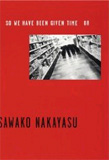 Review by C. St. Pérez
Review by C. St. Pérez
SO WE HAVE BEEN GIVEN TIME OR
by Sawako Nakayasu
Verse Press/Wave Books
1938 Fairview Avenue East
Suite 201
Seattle, WA 98102
ISBN: 0-9746353-0-8
2004, 106pp., $13.00
www.wavepoetry.com
Antonin Artaud, in “The Theater of Cruelty,” urges to “abolish the stage and the auditorium and replace them by a single site, without partition or barrier of any kind, which will become the theater of the action.” Sawako Nakayasu’s So We Have Been Given Time Or constructs this borderless site and blurs the line between theater and poetry to allow “the magical means of art and speech to be exercised organically and altogether, like renewed exorcism” (Artaud).
This book opens by violently subverting the logic of playwriting tags*:
Characters:
geography enthusiast, twice removed.
brother, as in your.
or as in oh.
young Czech intellectual, female.
estranged or expatriated cousin, male.
young man of marrying age, recent dumpee.
his too-kind mother, a goose.
owner of the voice on the answering machine.
soccer player whiffing a penalty kick.
bartender outside of his natural environment.
innocent spectators […] (1)
Although there are “characters,” what are we—as “innocent spectators”—to make of “or as in oh,” let alone mother goose, a twice removed geography enthusiast, and your brother? Nakayasu seems to follow Artaud’s imperative “to create a meta-physics of speech, gesture, and expression, in order to rescue it from its servitude to psychology and ‘human interest’.” The “characters” exist between gesture and thought, hinting at a certain metaphysics, but resolutely resisting a developed psychology:
Directions:
away
comma.
cross-country.
relational advisings push up closer or against.
downstage from boston.
75-degree angle from the ground.
buy this very expensive painting right now.
exit with purpose and earliness.
move.
a wall. […] (1)
By the end of the first page, we’ve lost our innocence in an attempt to “push up closer or against” indeterminate meaning. The “or” at the end of the title suggests it’s not only time we’re given, but time’s distortion:
Time:
given.
running.
in appropriate.
eating someone’s else’s
Time:
conspired to the point of friendly distortion.
friendly distortion. (5)
Friendly or cruel? According to Artaud, “it is of little importance whether these other levels are really conquered by the mind or not. i.e., by the intelligence; it would diminish them, and that has neither interest nor sense. What is important is that by positive means the sensitivity is put in a state of deepened and keener perception and this is the very object of the magic and the rites of which the theater is only a reflection.” Nakayasu’s distortions encourage a state of deepened perception—even when they discourage sense—by creating a space for us to enact these dissociative rites.
As the book progresses, more and more actors enter to create a dizzying chorus: “hands: together in unsettlement,” “sound: english everywhere,” “pressure: san ysidro crossing,” “climax: a year ago,” “irony: cathedrals everywhere,” “sails: an interlude of water,” “moments: conclusions everywhere,” and “room: unfillable box,” just to name a few. So We Have Been Given Time Or truly becomes an “unfillable box” as each new element opens the stage to further possibilities. Again, Artaud explains: “This language cannot be defined except by its possibilities for dynamic expression in space […] for dissociative and vibratory action upon the sensibility.” This “vibratory action” echoes lyrically throughout Nakayasu’s text:
Again:
to the good-light.
the near-light.
dear-light.
dear attentive.
to the nearest attention.
the weakest light.
a light removal.
slight removal.
light understatement.
near removal.
to the broad-light.
the once-light […] (65)
This passage, and many others, captures what Artaud calls “resplendent lighting.” And even though it does become difficult to understand the wild movement and unexpected angles this book takes, these lyric moments reward us with Nakayasu’s rare music that “extends the voice [and] liberates a new lyricism of gesture which, by its precipitation or its amplitude in the air, ends by surpassing the lyricism of words” (Artaud).
Within this precipitation, Nakayasu shapes her major theme: tenuousness. Meaning is tenuous amidst the breaking of logic. Narrative is tenuous amidst unsettled ground. Poetry itself is tenuous amidst silence:
And:
tenuous on its own terms.
tenuous insofar as it believes itself to be.
tenuous measure of distance.
tenuous act of sincerity.
And:
tenuous end of a line.
tenuous word hanging midair.
tenuous trying desperately to ground itself.
tenuous seduced by the lovely and the magical.
[…]
And:
tenuous hanging on and on to the last time the last line.
tenuous groping for a better word.
tenuous noting, keeping, guarding this moment.
tenuous taking it all in as a pain, pleasure, gift. (102)
So We Have Been Given Time Or guards the tenuous moments in which the poet clutches the end of each line to ground the right words. Nakayasu tenuously constructs this book on its own terms and lets go of these terms to allow “breaking everywhere” (57). Let’s keep Artaud for one last moment: “Neither humor, nor poetry, nor imagination means anything unless, by an anarchistic destruction generating a prodigious flight of forms which will constitute the whole spectacle, they succeed in organically re-involving [us], [our] ideas about reality, and [our] poetic place in reality.” As readers, we take it all in: the pain of always “bordering on meaning” (101); the pleasure of being “seduced by the lovely and the magical”; the gift and “dear-light” of Nakayasu’s poetry.
*Note: The formatting of quotes in this review do not match that of the poems in the book, which resembles that of a playbill.
Comments are closed.